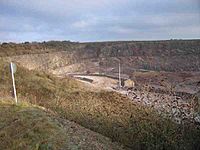Holwell Quarries facts for kids
| Site of Special Scientific Interest | |
 |
|
| Area of Search | Somerset |
|---|---|
| Coordinates | 51°12′13″N 2°23′37″W / 51.20355°N 2.39357°W |
| Interest | Geological |
| Area | 1.3 hectares (0.013 km2; 0.0050 sq mi) |
| Notification | 1952 |
Holwell Quarries is a special place in Somerset, England. It's known for its amazing rocks and fossils. This area is called a Site of Special Scientific Interest (SSSI). It helps scientists learn about Earth's past.
The site is quite small, about 1.3 hectares. This is like two football fields. It became a protected site in 1952. Holwell Quarries is located near Holwell and Nunney on the Mendip Hills.
Contents
Discovering Ancient Life
Holwell Quarries is a very important place for geology around the world. It has many rock formations that show different time periods. These include the Triassic period, the Lower Jurassic period, and the Middle Jurassic period.
What are Fissure Fillings?
The rocks here have something called "fissure fillings." Imagine cracks in old rocks that got filled up with new sediments over millions of years. These fillings are like time capsules! They hold clues about ancient life.
Amazing Fossil Finds
The fissure fillings from the Triassic period are super special. They have given us the best collection of animal fossils from the British Triassic. Scientists have found many different types of creatures here.
Reptiles and Dinosaurs
These ancient cracks have revealed 8 or 9 different kinds of reptiles. Some of the exciting finds include:
- A type of crocodile.
- A Placodont, which was a marine reptile. This was the first time this type of animal was found in Britain.
- Even dinosaurs! Fossils of Thecodontosaurus and Palaeosaurus have been discovered here.
Sea Creatures
The fissure fillings from the Lower Jurassic period also have important fossils. These include ammonites and brachiopods. Ammonites were ancient sea creatures with spiral shells. Brachiopods were shelled animals that lived on the seafloor. Finding these fossils helps scientists figure out the exact age of these rock layers.
 | William Lucy |
 | Charles Hayes |
 | Cleveland Robinson |

